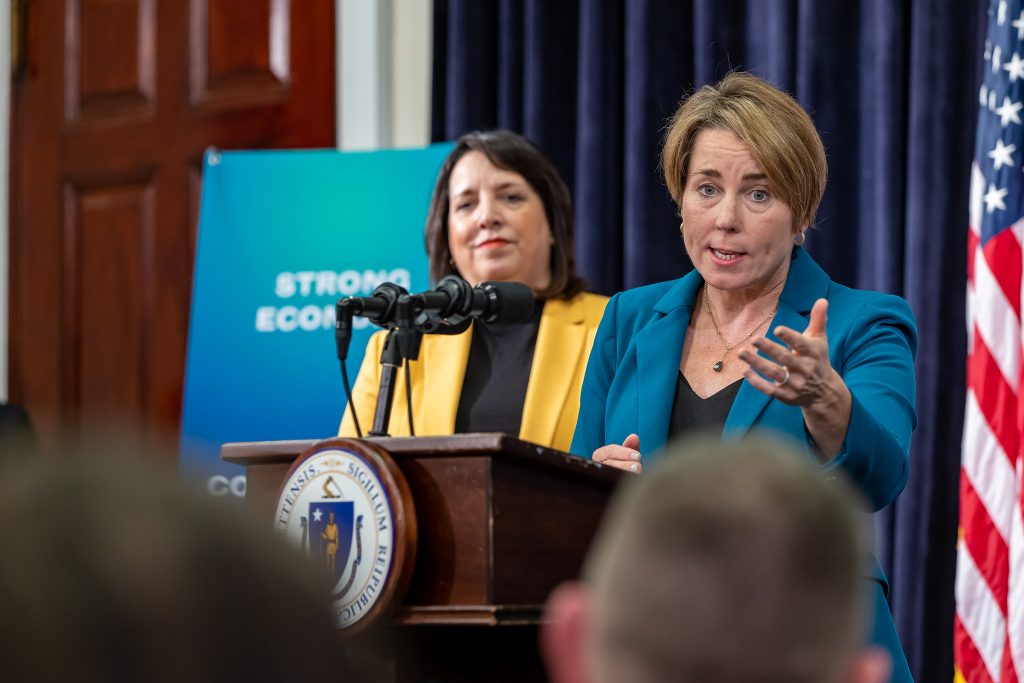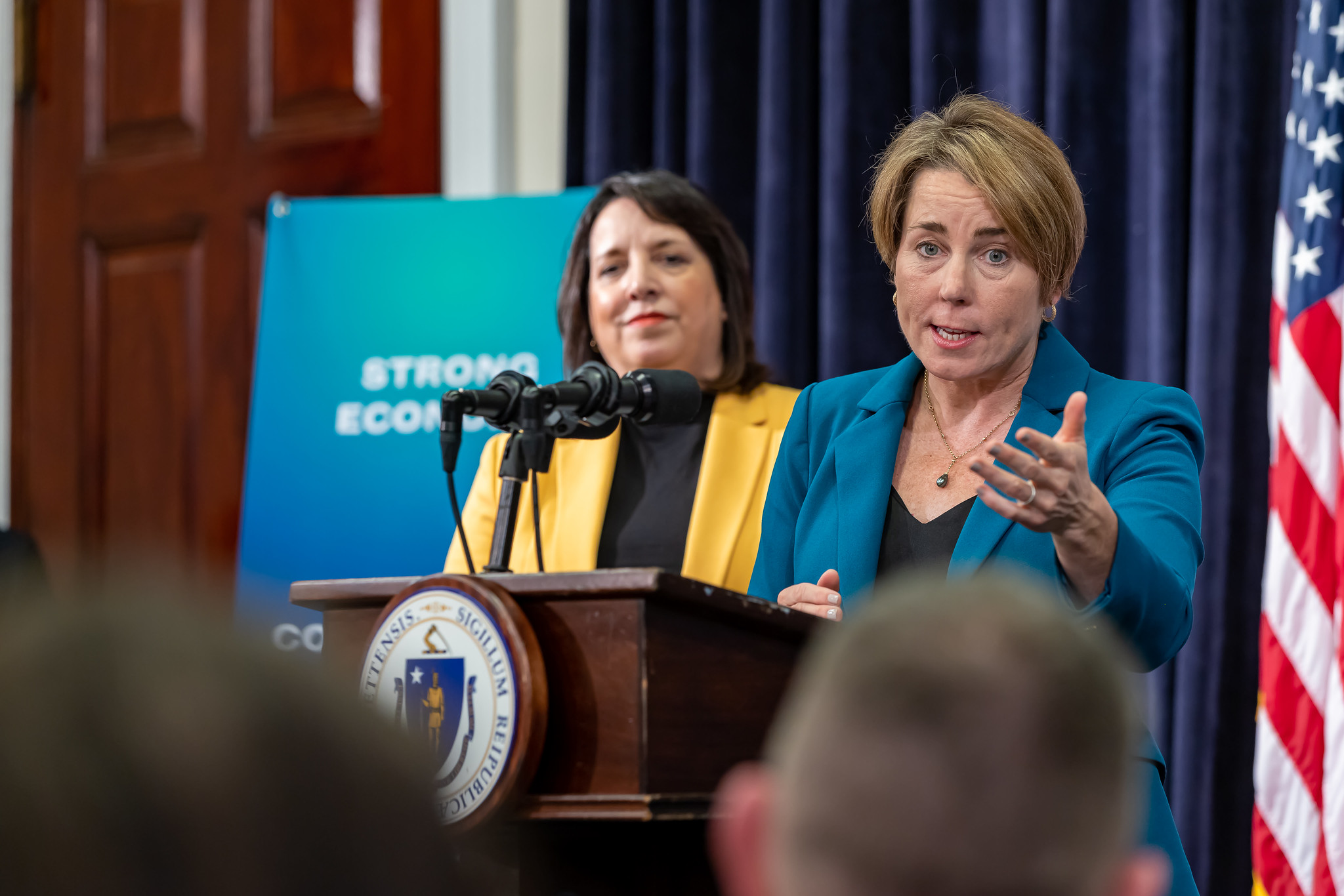In full transparency, the following is a press release from the Driscoll administration submitted to SOURCE media for publication. (Governor’s office photo)
***
[broadstreet zone=”53903″]
[broadstreet zone=”59984″]
BOSTON – Massachusetts Governor Maura T. Healey and Lieutenant Governor Kimberley Driscoll visited Franklin County today, March 10, to announce the creation of a Director of Rural Affairs to ensure that Massachusetts’ rural communities are better represented in state government.
Housed in the Executive Office of Economic Development, the Director of Rural Affairs will serve as a dedicated advocate and ombudsman for rural communities. They will be responsible for cultivating rural economic development and coordinating with secretariats and state agencies to ensure that state government is attuned to the unique needs of rural communities.
“Lieutenant Governor Driscoll and I want to lead an administration for all of Massachusetts, including our rural communities that contribute so much to our state. For the first time in state history, we will have a dedicated staff member committed to coordinating across state government to support economic development in rural communities,” said Governor Healey. “We want to send a clear message to every single person who calls rural Massachusetts home – we see you, we value you, and we’re going to work every day to ensure you have the representation and support you deserve.”
[broadstreet zone=”52386″]
“Governor Healey and I believe that a Director of Rural Affairs will bring the level of intentionality to our policy making that rural communities deserve. We’ve already gotten started on the work that needs to be done to support these communities, including proposing major funding boosts for Food Security Infrastructure Grants, rural school aid, PILOTs, and regional transit authorities and expanding the dairy tax credit cap,” said Lieutenant Governor Driscoll. “This is only the beginning – from budgeting to policy, we seem limitless potential to better serve our rural neighbors. We’re grateful for the work our partners in the legislature have done to support rural communities and look forward to partnering with them to build on these efforts.”
The Director of Rural Affairs will be tasked with conducting a review of all state grant opportunities to ensure that barriers for rural and small towns are mitigated. They will also be instructed to host dedicated office hours for rural towns to receive technical assistance to identify and explore grant opportunities. The Healey-Driscoll Administration also commits to maintaining and updating the Community Compact Connector Calendar so that small municipalities can find all state grants in one place and better coordinate their application efforts.
[broadstreet zone=”53803″]
The Healey-Driscoll Administration’s FY24 proposal also includes a number of provisions to support rural communities, including:
- $25 M for Food Security Infrastructure Grants (FSIG) to aid farmers, fisherman, schools, nonprofits, and local producers and construct infrastructure to bolster the local food system. This creates a permanent funding source for these grants for the first time.
- $7.5 million for rural school aid, a $2 million (36%) increase over FY23. This program provides rural districts with additional funding for the fixed costs of running a school district and exploring strategies to improve longer-term operational efficiencies.
- Increased payments in lieu of taxes (PILOT) for state-owned land to ensure full and equitable reimbursement. PILOT reflects property tax revenue forgone by cities and towns due to state ownership of certain land. H.1 funds PILOT at $51.5 million, a $6.5 million (14%) increase over FY23. This funding level reflects the most up-to-date property valuations while ensuring all municipalities will receive the same or higher payments in FY24.
- Expanding the dairy tax credit cap from $6 million to $8 million to better protect dairy farmers from fluctuations in wholesale milk prices.
[broadstreet zone=”59983″]
- Expanding base funding for RTAs by nearly $9 million. H.1 also adds $19 million for new grant opportunities for transit providers, including RTAs, to enable providers to explore new service models that better meet the needs of their communities, expand service to additional hours and days, and improve paratransit infrastructure. At least 25% would go towards providers serving rural communities.
- Increasing by $570,000 the Massachusetts Department of Agricultural Resource’s MassGrown and Fresher branding campaign, agricultural fairs, farmers markets, and agricultural education initiatives.
- Funding three new staff positions to support and bolster the Agricultural Preservation Restriction (APR) Program, facilitating farmland acquisition and protection.
- Expanding support for the Community One Stop for Growth by investing $1 million into technical assistance to help municipalities identify ways to breathe life into underutilized parcels and committing $600,000 for the Massachusetts Downtown Initiative to help further community development efforts in town centers and downtowns with planning support. These programs are included in an operating budget for the first time.
The administration’s budget also proposes funding for MassDOT to continue to advance the exploration of next steps for West-East Passenger Rail. This includes $650,000 for five full time employees, including the position of a West-East Rail Director. These individuals will collaborate on advancing a strategy to fund and implement service and infrastructure components needed for West-East Rail. The budget also recommends $12.5 million for components of a future West-East Rail, including track improvements at the Pittsfield Station and the study and design of Palmer Station.
“I’m grateful to Gov. Healey and Lt. Gov. Driscoll for their foresight in creating a position within our office dedicated to the unique challenges rural communities face,” said Secretary Yvonne Hao of the Office of Housing and Economic Development. “Our economy needs to work for everyone, including the 181 rural communities and small towns across our state. Through this role, rural and small towns will have an advocate in state government committed to helping their economies thrive.”
[broadstreet zone=”56696″]


